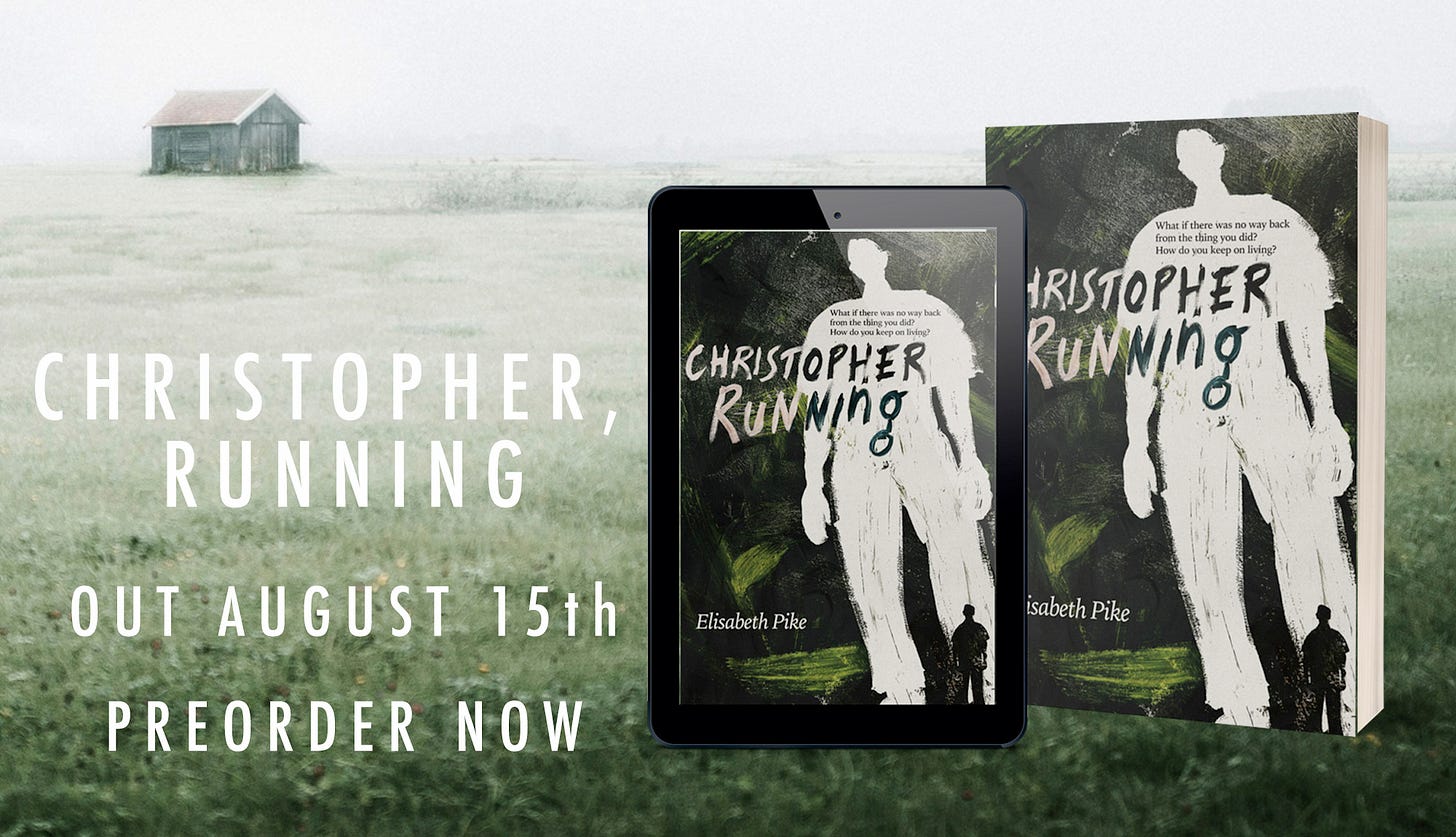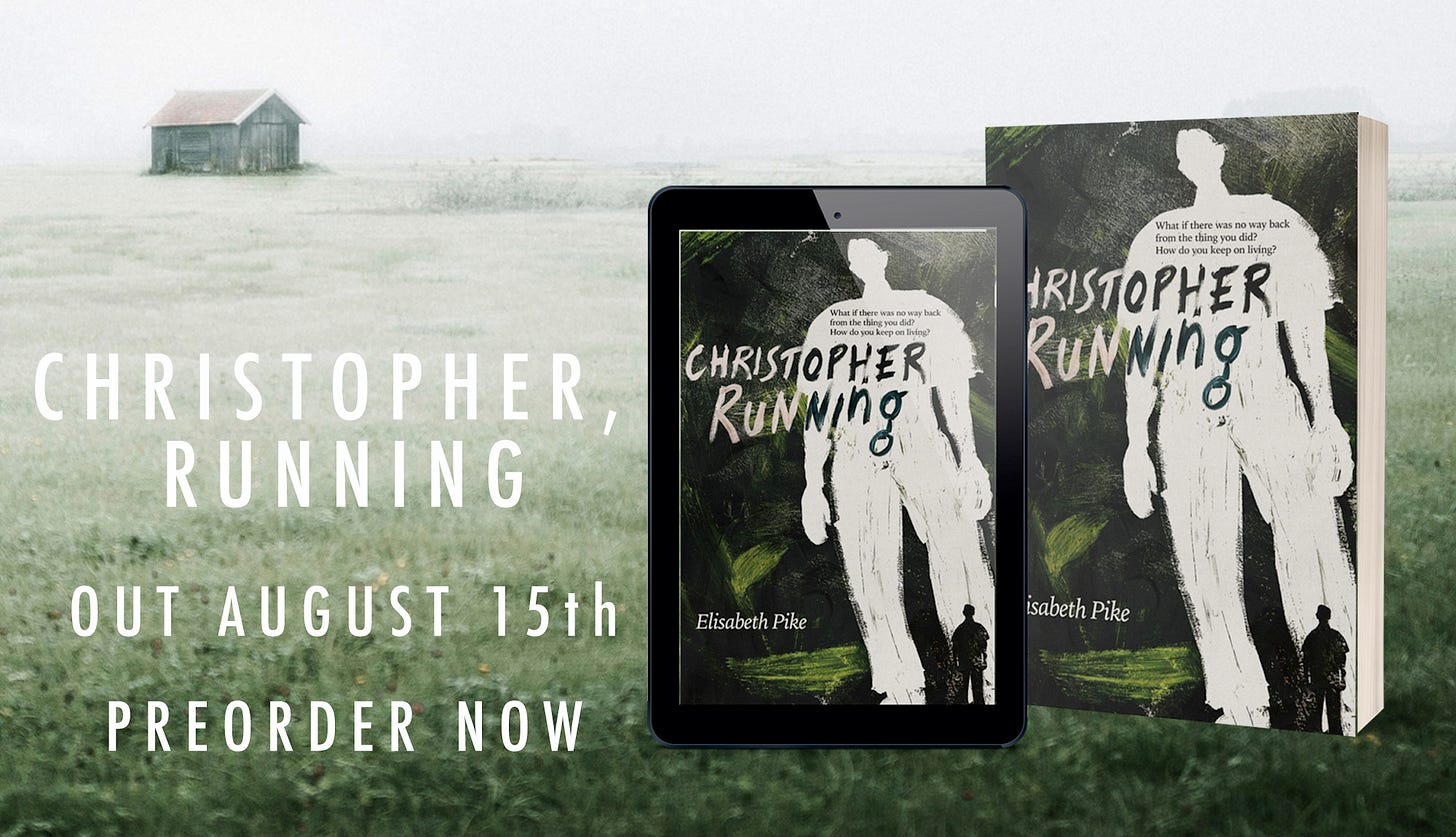Well, that’s it - the ARCS (advance reader copies) of Christopher, Running are out! It feels momentous and scary to have finally let go of this one. It has been half a lifetime in the making! That’s not to say it is a huge, rambling thing. Instead, it is concise and clean, perhaps because it has been torn apart and rewritten many times.
You see, this is the book that first called me to writing, so letting go of it feels like a big deal. It was in my English class at secondary school that I first started writing about the Fens. It was the place my dad grew up, and we visited many times throughout my childhood. It seemed to me strange and full of interesting people, accents, and habits - a place that I couldn’t fully understand. I didn’t know it at the time, but a rich seam of memory was being laid down in me.
In a chapter from my book Circles (republished chapter by chapter on Miners last year), I wrote about this:
‘There is always a mixture of things that go into a novel; a culmination of interests, of curiosity from my childhood, strange tales from my father, an attempt to make sense of those things that don’t make sense, especially in the mind of a child, and I think we are drawn to certain things subconsciously and only the unfolding of time will tell us why. Or maybe we will never know why. I remember a piece of writing that I was pleased with at secondary school. It was a description of my grandmother’s garden, the tumbledown sheds, and the willow that you could hide yourself in, and it stayed with me, the mystery of that place. It seemed like something I could write about. There were layers and layers of memories in that garden; tasting juicy apples straight from the tree, learning to roll the old rusty barrel under my feet, my uncle pulling an armchair out onto the lawn in the blazing sun. And those layers have settled down over time to create a rich source of material, of feeling, memory, and detail, which comes back when I start to dig.’
You can find the full post here:
https://minersbyelisabethpike.substack.com/p/letting-go-b11
Learning to Write
The first time I tried to tell this story, I didn’t have a plan, and the more I wrote, the more I felt I was tying myself in knots. At that point, no one had told me how to write a novel, and I didn’t really know any better, so I just wrote, chapter by chapter. Since then, Save the Cat has shown me the absolute necessity of having a plan to save you from going off track. I received some feedback saying that my book was just a series of events that happened, and none of the characters changed. Save the Cat opened my eyes to the beauty of reading. Because we read for the transformation. We read for the impossible situations that characters get themselves into and out of. We read for resolution, changed lives, and bravery.
So, I unpicked the novel, like a jumper, and kept what I knew were the bones of the story - the story of Christopher and Alice. They were the living threads, with the other stories weaving around them. I cut half of the book out, sat down with my characters, and worked out what it was that they really wanted.
I rewrote Christopher, Running in a difficult year of sending Murmuration off 100 times to agents. It was soul-destroying, and I really needed something to focus on while simultaneously feeling like an abject failure! So it’s very nice indeed to be on the other side of publication for Murmuration, and to have finished this project too.
Digging
The idea of digging in our writing takes me back to that marvellous essay by Seamus Heaney entitled ‘Feeling into Words,’ from Finders Keepers.
He speaks of writing his poem ‘Digging,’ saying that ‘I wrote it down years ago; yet perhaps I should say that I dug it up, because I have come to realize that it was laid down in me years before that even.’
I love the way that he talks of the seams of memory that are laid down in us, and how, as we start to dig and dig with our pen, we find all these treasures that we were previously unaware of.
We dig also to find ourselves, and this is for sure what I was doing in Christopher, Running. At first, I was digging for mystery, mixing the places I had seen with my father’s tales, and then I dug for myself when I realised that the things I was writing were helping me to answer the questions I had in my own life. I wrote to find the edges of myself. I wrote to hear myself.
Reading it back, recently, I realised that I am Alice, lost in caring for those around her. I am Christopher, searching for his own voice, which has been drowned out in the noise of all those swirling around him. I am Esme, not sure what is true. In a way, I am all of the characters; parts of me have gone into them, and parts of them have merged with me. This is the magic of writing; our writing transforms us as we write.
Although Christopher, Running is quite different from Murmuration, they still feel like brother books in my mind. There is my obsession with static caravans, still! There are unhinged characters who can’t make sense of their past. There are things left open, unfinished stories all over the place. There is a setting of the bleak Fens, wide and windy, not the kind of place to hold you if you were trying to get away. There is coincidence and love, loyalty, and a sort of closure in the end.
So I’m so proud that I was stubborn-minded enough to plough on with this book of my heart. I feel like I’ve dragged this story through twenty years of my life, and now I present it to you!
As I said, the ARCS have landed in inboxes, and I will see what people make of it.
If you’re intrigued, the preorder for ebooks is now live, and you can preorder here.
I’m wondering how I can distill this Miners post into a single lesson, and I think it is this: sometimes we need to hang on to a dream, or a kernel of thought, for a long time before it comes to anything. Sometimes, we have to be that dog with a bone, refusing to let go.
If this is you, don’t give up.
Put things aside for a season, by all means, but don’t give up.
As always, thanks so much for reading Miners,
Elisabeth x




